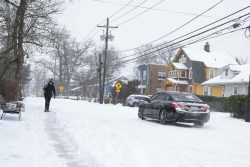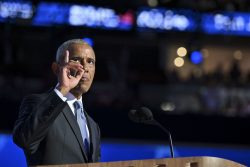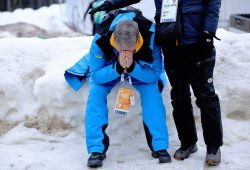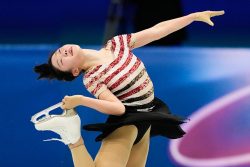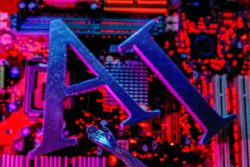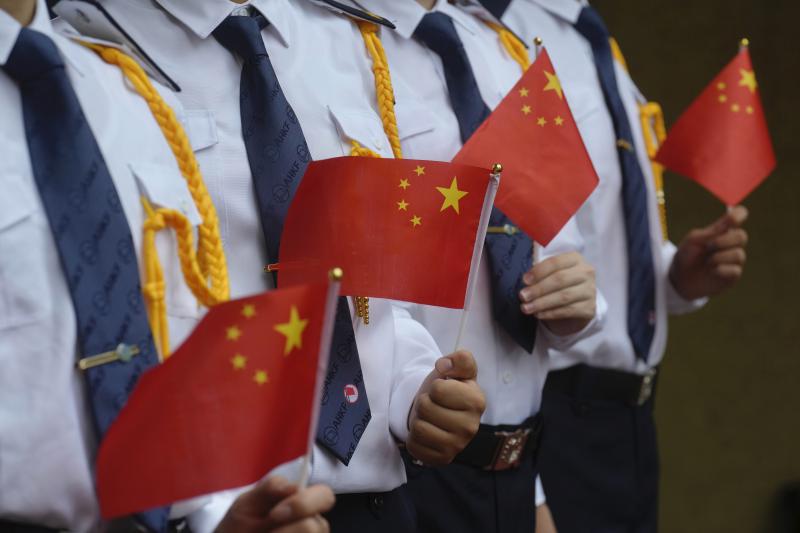
Students hold Chinese national flags during a flag raising ceremony to mark the 24th anniversary of Hong Kong handover to China at a school in Hong Kong on July 1, 2021.
11:44 JST, June 23, 2022
HONG KONG – A decade ago, thousands of Hong Kong students hit the streets to protest proposed changes in the school curriculum they felt were designed to brainwash them and strip critical thinking from the classroom. Taken aback by the magnitude of the demonstrations, authorities quickly shelved the idea.
Ten years later, even more drastic revisions of the curriculum are taking place with barely a murmur, as an all-encompassing security law written by Beijing crushes dissent in a city once characterized by its open debate.
New textbooks have been written saying that Hong Kong was “occupied” but never a British “colony.” A list of banned books – which the government refuses to publicize – has librarians on edge. A school subject devoted to cultivating critical thinking and creativity will be replaced by one focusing on citizen values.
Many teachers are taking a look at the new environment and leaving.
Under the one country, two systems approach, Hong Kong originally kept its educational system when it came under Chinese rule in 1997 and did not have the “national security” focus found in the mainland that is dedicated to building students’ sense of national identity and patriotism.
The most obvious change in Hong Kong came in the new year, when primary and secondary schools started holding weekly ceremonies for raising the flag of the People’s Republic of China. Previously, officials only encouraged it to be displayed on special occasions, like the handover anniversary.
The real changes beneath the surface, however, started soon after the 2020 passage of the Beijing-written national security law that outlawed the kind of protests that had wracked the city for a year and directing schools to promote “national security” on campus.
With many students participating in the pro-democracy protests, then-Chief Executive Carrie Lam said there were “deficiencies” in promoting national education and promised to do more to instill patriotism among young people – something Beijing had increasingly pushed for.
Christine Choi, one of the officials responsible for the failed 2012 education overhaul, will be taking over the education department in July and has said one of her key goals is to foster a sense of national identity among young people.
Publishers are revising textbooks to fall in line with the Chinese government’s preferred narrative – in which Britain was an occupying power in Hong Kong and the Communist Party a benevolent force, while the homegrown struggle for democracy never existed. At least four new textbooks sent to Hong Kong’s schools for pre-publication review no longer call Hong Kong “a colony” but an occupied territory.
Even though Hong Kong was occupied by the British after the Opium War, it is still a territory belonging to China, according to one textbook released by Hong Kong publisher Modern Educational Research Society, seen by The Washington Post.
Hong Kong island, according to mainstream history, was ceded to Britain as a colony in 1841 by the Qing Dynasty as part of a peace treaty ending a conflict known as the Opium War. When the Communist Party took power in 1949, it announced it did not recognize any of the treaties signed by the Qing.
The Tiananmen Square massacre of 1989, when Chinese forces crushed a months-long pro-democracy demonstration in the heart of Beijing, was already downplayed in textbooks as early as 2014. It had been reduced to a page-long “incident,” though non-Chinese sources were also used for casualties.
In one of the new Chinese history textbooks, it has been reduced to a paragraph, with no photos or mention of a toll or the annual vigil for the victims once held in Hong Kong.
Beijing is “re-engineering Hong Kong education in full force,” said Ho-Fung Hung, a professor of political economy at Johns Hopkins University. “It’s turning a subject that used to cultivate critical thinking into mainland-style patriotic education inculcating the party line to children.”
The textbooks are for a new course on citizen values that is replacing the previous subject of Liberal Studies, a course for seniors aimed at fostering critical thinking among students, with topics including globalization, public health and modern China. The new subject focuses on national identity and includes an excursion to the mainland.
Educators bear the brunt of the shrinking spaces for teaching and sweeping changes in curriculum. The Hong Kong government has released guidelines to incorporate national security education for at least 15 subjects, including physics, chemistry, and business and accounting, which 80 percent of schools found “hard to implement” with “a lack of understanding” of the matter, according to a survey by a pro-government foundation.
Lo Kit-ling, a secondary school teacher, said front-line teachers found the guidelines unclear and said there was a pervasive “sense of helplessness” among colleagues.
We are still observing and tend to act conservatively and censor ourselves more because we do not want to violate the security law, she said, adding that in the current atmosphere, parents are encouraged to file complaints against teachers.
It seems like Hong Kong’s education system is a train that goes backwards, Lo said.
Librarians are also under pressure because of a government order that school libraries should remove books endangering national security, even while it refuses to publish a list. Education Bureau has maintained that the current guidelines are “very clear.”
But a school librarian, who spoke on the condition of anonymity because of security concerns, said the lack of an official list has been a source of confusion and stress when it comes to managing her library and not putting her employer in trouble. For example, books written by jailed activists or those that contain criticisms about the Chinese government would be in a gray area for her, but with no clear guidelines, she pulls them to be safe.
I will pull these books out first but not throw them away and check with other school librarians, she said. “My heart is heavy when I pull out these books.” Amid the rising stress of her working environment and the broader suffocating societal atmosphere, she has filed for early retirement.
Faced with self-censorship, many teachers have also decided to leave. During the 2020-21 academic year, 987 teachers left their jobs, double the number from the previous school year, an average of around seven teachers per school, according to a survey by the Hong Kong Association of the Heads of Secondary Schools in May.
In the survey, most teachers cited the society’s overall atmosphere as the major reason for leaving, followed by family considerations.
Some teachers, however, choose to remain in Hong Kong, for one simple reason: their love for the city. Jacky Yu, a Chinese-language teacher at a secondary school, said he still has faith in face-to-face teaching with students.
I have never felt hopeless. The changes in official education guidelines cannot affect the relationships between students and teachers. As a teacher, there is still space for me to exert influence on my students through how I conduct myself as an upright person, and whether my teachings can touch their hearts. These still have a much greater impact than the guidelines, he said.
Top Articles in News Services
-

Prudential Life Expected to Face Inspection over Fraud
-

Hong Kong Ex-Publisher Jimmy Lai’s Sentence Raises International Outcry as China Defends It
-

Japan’s Nikkei Stock Average Touches 58,000 as Yen, Jgbs Rally on Election Fallout (UPDATE 1)
-

Trump Names Former Federal Reserve Governor Warsh as the Next Fed Chair, Replacing Powell
-

Suzuki Overtakes Nissan as Japan’s Third‑Largest Automaker in 2025
JN ACCESS RANKING
-

Japan Institute to Use Domestic Commercial Optical Lattice Clock to Set Japan Standard Time
-

Israeli Ambassador to Japan Speaks about Japan’s Role in the Reconstruction of Gaza
-

Man Infected with Measles May Have Come in Contact with Many People in Tokyo, Went to Store, Restaurant Around When Symptoms Emerged
-

Prudential Life Insurance Plans to Fully Compensate for Damages Caused by Fraudulent Actions Without Waiting for Third-Party Committee Review
-

Woman with Measles Visited Hospital in Tokyo Multiple Times Before Being Diagnosed with Disease



